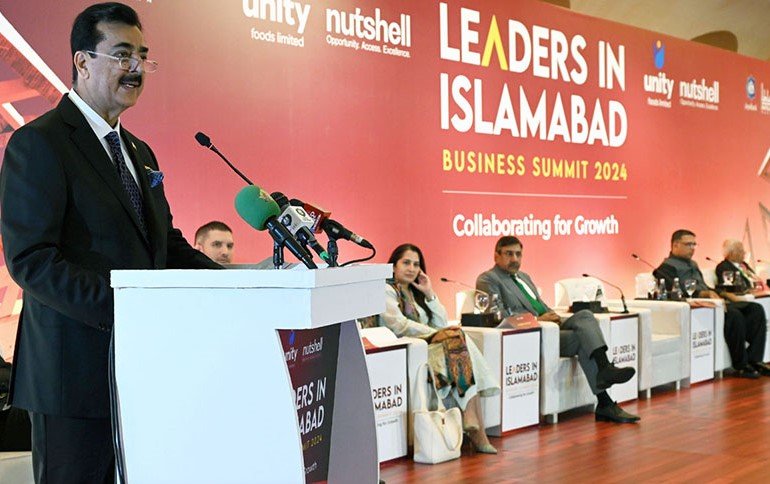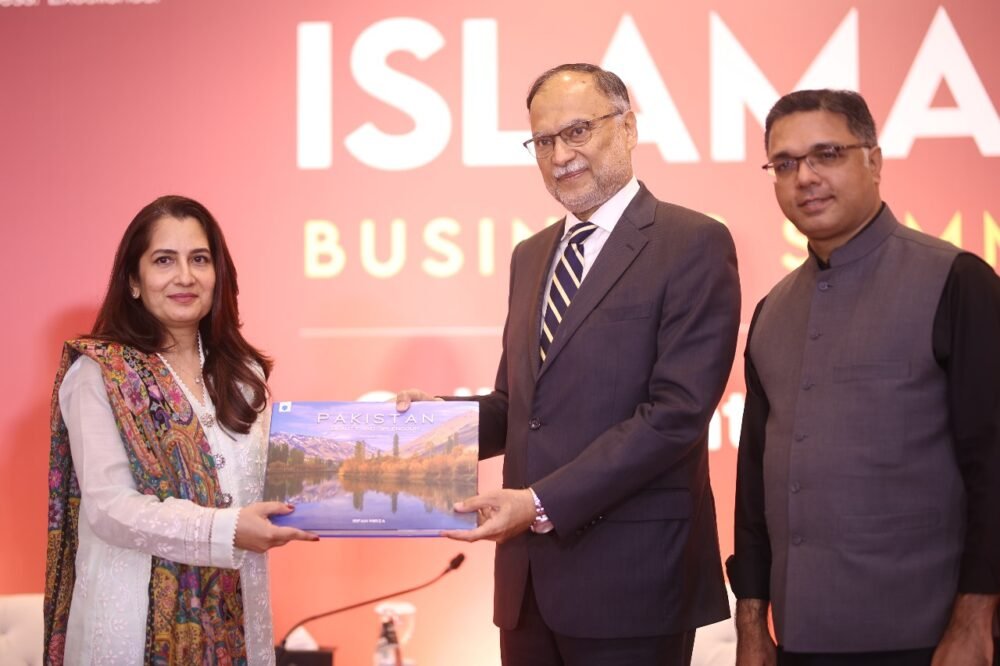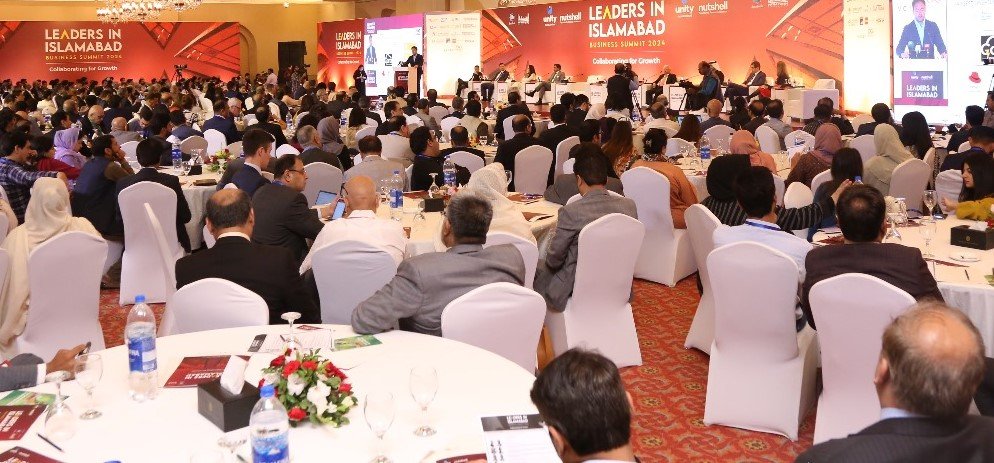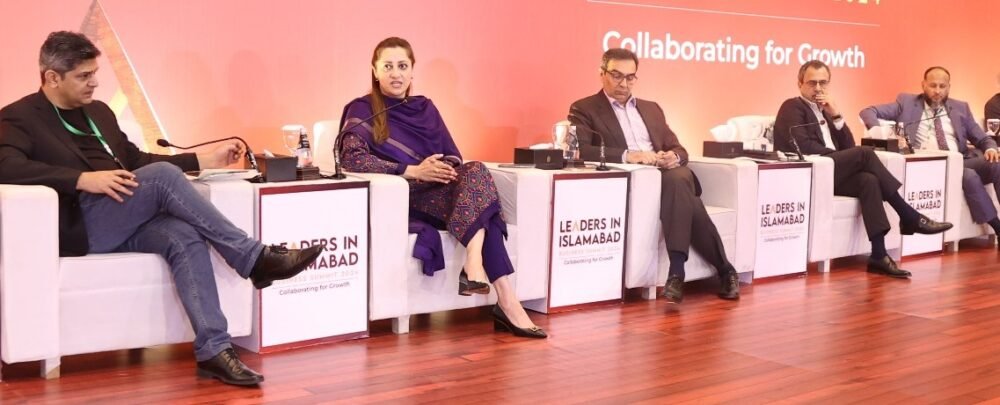Legislators, economists and business leaders advocate for bridging the political and social divide, shared goals to address social, economic and environmental challenges
Special Correspondent
Islamabad, April 24: Legislators, economists, and corporate figures alike have emphasized the importance of bridging the political divide and fostering collaborative efforts and cooperation to tackle the growing economic, social, and environmental issues.
They spoke at the inaugural session of the two-day 7th Edition of the Leaders in Islamabad Business Summit (LIIBS), which kicked off at a local hotel on Tuesday. The event drew over 15 international speakers and welcomed over 1,000 delegates, to explore avenues for growth and promote collaboration for mutual advancement and prosperity.
Senate Chairman Yusuf Raza Gilani emphasized the need for a forward-looking strategy to enhance Pakistan’s infrastructure, drawing inspiration from successful regional collaborations worldwide while addressing the audience.
He stressed the urgency of bridging political divides, especially in the face of record-high inflation and declining investment leading to a drop in per capita income. Highlighting environmental challenges such as floods, rainfall, and rising temperatures, he noted Pakistan’s abundant resources and talent.

However, he underscored the necessity of concerted efforts through collaboration within government, across industries, and between the public and private sectors, as well as with regional and global partners, to fully leverage Pakistan’s potential.
Minister for Planning and Development Ahsan Iqbal shared his perspective during a discussion titled “The Big Picture”. He urged a shift away from political gamesmanship toward a focus on economic development for the next few years.
Prof Iqbal emphasized the importance of both competition and collaboration for success. He suggested competing for market share while advocating for collaboration to strengthen industry share. He believes that adopting this strategy can propel Pakistan onto a growth trajectory within the next two years.


Agriculture & technology
Minister for Finance Muhammad Aurangzeb emphasized the proactive role of the government, particularly in agriculture and IT exports, as key drivers for Pakistan’s economic growth. He noted a significant 33.6% increase in agricultural loans from July to February of the current fiscal year, indicating a focus on supporting these sectors. He also underscored the government’s efforts to address inflation and provide relief to vulnerable segments of society.
Moreover, he reported a 30.2% increase in FBR tax collection, surpassing the target of Rs6,707 billion, and outlined collaborative steps between the ministries of finance, law and FBR to enhance revenue collection.
Minister for Energy Awais Ahmad Leghari, speaking as chairperson of the session, reflected on the dynamics of Pakistan’s power sector, its myriad challenges and the delicate balance required to sustain growth while addressing socioeconomic disparities.
Leghari stressed the necessity for subsidies on certain essentials to protect vulnerable classes and advocated for a nuanced approach that supports both industrial development and affordability for essential items across society.
Noted economist, former minister and SBP governor Dr Ishrat Husain stressed the importance of collaboration, broad-based and sustainable development that benefits the entire population, not just a privileged few.
Dr Husain advocated for the establishment of a common goal with a shared mandate. Drawing from the experience of developing countries over the past 70 years, he highlighted the significance of physical, human, natural, social and intellectual capital in driving growth and prosperity.
Minister of State for IT & Telecom Shaza Fatima Khwaja shared the government’s vision of three vertical digitization — governance, economy, and society.
“We will be inviting tech experts from across the country and around the world to assist us and ensure transparency, ease of doing business, and streamlining governance which will result in sustainable growth.”
Earlier former minister for investment Muhammad Azfar Ahsan, extended a warm welcome to the public sector leadership, global leaders, and delegates. He reiterated the shared vision of Unity Foods and Nutshell Group for a prosperous, self-sustaining, and stable Pakistan. Azfar stressed the importance of collaboration among the Private, Public, and Military sectors, noting that Pakistan stands at a critical juncture.
He expressed confidence in the finance team, led by Finance Minister Muhammad Aurangzeb, to cooperate effectively. Azfar emphasized the necessity of competent teams across four key stakeholder domains: political government, bureaucracy, business leadership, and the business community, for the country to progress.

In his welcome speech, Unity Foods chairperson Lt-Gen (retd) Omar Mahmood Hayat expressed his enthusiasm for fostering more collaborative efforts to serve Pakistan’s national interests.
He emphasized the need for businesses in Pakistan to come together in the current environment. Gen Hayat highlighted the importance of promoting public-private partnerships to tackle industry challenges, advocate for regulatory reforms, and advance sustainable development initiatives.
Lasha Tabidze, Global Chief Digital Officer at VEON, emphasized the transformative role of technology in collaborative endeavours, particularly in Pakistan’s digital future. He highlighted a focus on rural and suburban areas, underscoring JazzCash’s commitment to reducing the financial gap by empowering women and the youth. Tabidze pointed out impressive statistics, with 30% of total JazzCash wallet customers being women, alongside 23,000 registered women merchants and 6,000 women agents involved in the network’s digitalization efforts, demonstrating the vast potential for growth and inclusion.
Layth Al Falaki, Chief Executive Officer of GuarantCo, highlighted the evolving African landscape through collaborative infrastructure ventures with embedded financing mechanisms.
He portrayed Pakistan as an ideal pilot study, citing a decade of investment experience with 20 projects primarily in alternative energy and digital sectors.
Falaki drew attention to the significant infrastructure and social sector financing gaps in Asian countries, estimated at $450 billion and $900 billion annually, respectively.
The pre-lunch session concluded with a thought-provoking dialogue on “Climate & Infrastructure,” moderated by Sajjeed Aslam, Partner at Spectreco LLC, USA. The panellists included Boo Hock KHOO, Chairman of the InfraZamin Board; Philip Skinner, Head of Middle East, North Africa and Pakistan at GuarantCo and Origination Lead for Nature at the Private Infrastructure Development Group (PIDG); Karen Tsand-Hounsell, Head of Business Development at InfraCo, Asia Development; Emilio Cattaneo, Head of Technical Assistance at PIDG; and Maheen Rahman, Chief Executive Officer of InfraZamin Pakistan.
They engaged in an exchange of views on strategies aimed at fostering a sustainable and secure.
Expressing concern for sustainable and long-lasting infrastructure, Boo Hock said, “Financing is available, but why it fails to show up in a company or project is because of lack of confidence. Money inflow is principally based on confidence.”
Taking his thoughts forward, Philip added, “GuarantCo aims to mobilize the local currency market in Pakistan. We focus on mobilizing domestic sources of capital like bond markets or bank markets by using our guarantee as a form of credit enhancement to move capital into projects.”
Maheen emphasized the imperative of collaborative efforts to ensure Pakistan’s stability, stressing the pivotal role of the private sector in advancing project development and driving the country’s progress. She underscored the need to move away from perpetual dependence on fiscal resources.
She highlighted a significant disparity, noting that Pakistan’s total private sector lending stands at 17% of GDP, whereas countries like India and Bangladesh are in the range of 50-60%. She advocated for increased lending into the Pakistani system, emphasizing the importance of robust and viable projects to attract such investment.
Infrastructure
Expanding on the conversation, Karen emphasized the transformative role of infrastructure as a catalyst for progress, highlighting underinvestment as a significant challenge. She noted that sovereign balance sheets may not be sufficient to meet infrastructure needs, necessitating the involvement of private sector capital.
Karen emphasized the importance of fostering investor confidence to attract private investments in the sector.
Emilio highlighted the critical role of technical business offerings as an essential catalyst in ensuring the successful structuring of projects, especially in terms of guaranteeing a positive climate impact and sustainably constructing them. Emilio’s statement underscores the importance of technical expertise in driving forward projects that align with environmental sustainability goals.
The third session on “Emerging Leadership Issues” featured addresses by Praveen Thakur, Vice President Asia at Teradata, and Lucia Real Martin, GAICD, Global Executive Director at ACCA. They explored the role of AI and Big Data in collaborative ventures and discussed the readiness of organizations leveraging modern technology for sustainability and success.
Power conundrum
The fourth session, titled “Pakistan’s Power Sector: The Way Forward,” included an address and a panel discussion with industry leaders: Mohammad Ali; Syed Moonis Abdullah Alvi, Chief Executive Officer of K-Electric; Ruhail Muhammad, Chief Executive Officer of Lucky Electric Power Company; and Ayla Majid, ACCA’s Global Deputy President and Founder & CEO of Planetive. The session was moderated by Sajjeed Aslam, Partner at Spectreco LLC, USA.
Sajjeed initiated the discussion by highlighting the critical link between the power sector and economic development. Ali, drawing from his extensive experience in both the public sector and private industry, provided profound insights into a collaborative framework.
He noted that nearly half of Pakistan’s electricity generation capacity is under government control, encompassing hydroelectric and nuclear power plants. While these sources contribute significantly to energy security, they also pose challenges in terms of efficiency and cost-effectiveness.


Moonis emphasized the necessity of strengthening the power sector through privatization. He proposed that all distribution companies slated for privatization should be given specific targets regarding their current and future costs. These targets would serve as benchmarks for performance, with accountability measures in place to ensure continuous improvement. Moonis emphasized that only through this approach can the circular debt be effectively reduced.
Expanding on the discussion, Ayla emphasized three key principles regarding electricity: access, affordability, and sustainability. She highlighted the need to increase the utilization of local fuels in the electricity sector and noted the decreasing costs of alternative energy resources. Ayla pointed out that solar energy is now 80% cheaper, while the cost of land-based wind turbines has decreased by 50%. Additionally, she mentioned the declining prices of electricity batteries.
Adding to the conversation, Ruhail stressed the importance of two factors for future investments in transmission: the continuity of policies and the streamlining of transparency rules. He emphasized the necessity for collaboration between the private sector and the government in this regard.
Digital future
The concluding session of the day, titled ‘Exploring The Digital Future,’ was moderated by Mujeeb Zahur, Managing Director at S&P Global Pakistan. Panelists including Asif Peer, CEO & Managing Director of Systems Limited; Muhammad Hamayun Sajjad, Chief Executive Officer of Mashreq Pakistan; Abdul Haseeb, Managing Director of TMC Private Limited; Ali Naseer, Chief Data & Strategy Officer at Jazz; and Nadeem A. Malik, Secretary General of the Pakistan Software Houses Association, discussed the impact of technology and the evolving dynamics of global competition.
Asif emphasized the necessity for generating more business ideas in Pakistan, leveraging its diverse customer base. He stressed the importance of not just optimization but holistic transformation, advocating for personalized solutions with a progressive mindset.
This was echoed by Hatem Bamatraf, President & CEO of PTCL Group. He emphasised digitization as a catalyst for development and the crucial role of connectivity in driving progress, asserting that a robust telecommunications infrastructure is essential to advance all other industries.
Bamatraf highlighted Pakistan’s potential to benefit from the ongoing industrial revolution, given its status as the 5th most populous country with a youthful demographic comprising 60% of the population. He pointed out that being born into the digital age gives Pakistani youth a significant advantage, especially since many are proficient in English, providing them with a competitive edge in the global market.
Hamayun highlighted the crucial role of financial inclusion through digitization, noting that Pakistan has seen a significant increase in women’s workforce participation due to the ability to work from home. He pointed out that despite progress, 24% of the world’s population remains excluded from financial inclusion, prompting a push from the World Bank to include these 1.7 billion people.
Ali underscored the importance of strengthening the telecommunications sector to embrace the digital future. He noted that while there is excitement about digitalization, many people still prefer traditional methods in their daily lives. Ali emphasized the need to balance this comfort with the aspiration for a digital future, acknowledging that analogue processes still play a significant role in daily life for many individuals.
Abdul Haseeb reinforced the importance of staying digitally ahead by emphasizing the focus on acquiring new skills and fostering talent development. He highlighted that rather than fixating on a specific technology, the ability to adapt and learn new skills is crucial, as technology continues to evolve.
Summarizing the discussion, Nadeem emphasized the industry’s need to fully embrace technology across all sectors. He highlighted the rapidly evolving digital economy worldwide and Pakistan’s potential to excel in this arena, given its young population and growing tech space.
The 7th Edition of LIIBS is co-hosted by Nutshell Group and Unity Foods, in partnership with OICCI (Overseas Investors Chamber of Commerce and Industry), with Faysal Bank as the platinum partner, and InfraZamin Pakistan as the strategic partner. This year’s theme for the event is ‘Collaborating for Growth’.

The High Asia Herald is a member of High Asia Media Group — a window to High Asia and Central Asia

